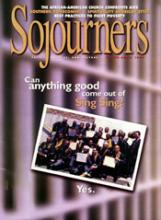From the Reagan administration's curtailment of the welfare state in the 1980s to the first Clinton administration's attempt to replace welfare with guaranteed work, churches were not regarded as central players in poverty reform. With the passage of welfare reform in 1996, faith communities moved from relative obscurity on the issue to a new-found popularity.
After years of being ignored, urban churches are now being added to the invitation lists of prominent political gatherings. This is a heady moment, even for those who have made a principled commitment to practice their faith at the margins of society. Yet the flattery and excitement of recognition must be tempered by theological caution. Jesus didn't refrain from attending a dinner and associating with the financial and political elite. Yet it was in that setting that he told the vexing parable of the banquet to which God invites the poor, maimed, blind, and lame, while the prosperous are too busy to attend.
The rising visibility of urban churches among political elites results from the confluence of three quite different streams of interest. First is the neoconservative agenda of social reform. The neoconservative project combines a commitment to curtail the welfare state, for both fiscal and moral reasons, with a hope of unleashing the creative genius of local communities to solve their own problems.
Read the Full Article
